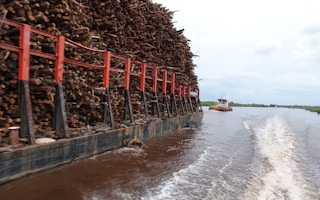Greenpeace has backed away from a landmark agreement to stop campaigning against Asia Pulp and Paper (APP), Indonesia’s largest pulp and paper firm.
This agreement was signed in 2013 when APP committed to zero deforestation following years of campaigning by the green group.
In a new report released on Wednesday, Greepeace claims that APP has continued to harvest rainforests after promising to stop deforestation with a landmark conservation policy drafted in February 2013.
Greenpeace, which was the main architect of APP’s widely-lauded Forest Conversation Policy (FCP), claimed in a strongly worded statement that the company—through undeclared affiliates—has cut down more than 8,000 hectares of rainforest since making its zero deforestation pledge.
“
In 2013, APP committed to end its role in deforestation and introduced new conservation commitments. Progress since then has been mixed and it is now in jeopardy due to links to ongoing rainforest destruction.
Kiki Taufik, global head of the Indonesia forests campaign, Greenpeace Southeast Asia
Greenpeace’s announcement emerges five months after an investigation by the Associated Press (AP) found that APP has close connections to wood suppliers responsible for deforestation and haze-causing peatland fires in Indonesia.
APP has said that it has no such ties with these firms, but AP’s investigation tied environmentally destructive firms to employees of Indonesia-listed Sinar Mas, APP’s owner.
Greenpeace said that satellite image analysis found forest clearing in the concessions of two companies with such connections to Sinar Mas.
One of these companies, West Kalimantan pulpwood firm PT Muara Sungai Landak (PT MSL), which is owned by two employees of Sinar Mas Forestry, has cleared 3,000 ha of forest since APP announced its FCP, according to Greenpeace’s report.
Another pulpwood firm with Sinar Mas ties, South Kalimantan-based PT Hutan Rindang Banua, has cut down about 5,000 ha of forest since 2013, the study claims.
Kiki Taufik, Greenpeace Southeast Asia’s global head of the Indonesia forests campaign, said that the findings showed that APP is “not genuinely serious” about stopping deforestation in Indonesia.
He said APP “must immediately come clean about all its ownership links to companies with concessions, stop the bulldozers and restore what was destroyed.”
“It’s only this action that can save APP/Sinar Mas from further campaigns, and contract cancellations by customers.”
APP, in a statement posted on its website, said it was “disappointed” by Greenpeace’s decision after communicating “transparently” with the organisation over the last three months, and claimed that the green group had “expanded the issue to the rest of the Sinar Mas Group, which is outside the scope of the FCP”.
The land identifed in Greenpeace’s report referred to concessions that APP does not own, and has “no jurisdiction over,” the company said in the statement.
“
The fight against deforestation in Indonesia is a complex issue and not one where any organisation can resolve by themselves. The era of cooperation between Greenpeace and APP has achieved much, but the fight is far from over.
Asia Pulp and Paper statement
It added that it would reject any supplier that flouted its conservation policy “regardless of who their shareholders are.”
APP also pointed out that over the last five years, the company had protected more than 600,000 ha of rainforest in its concessions and those of its suppliers.
A report by a coalition of 10 green groups released on the fifth anniversary of APP’s conservation policy concluded that the firm, which over its history has cleared an estimated 2 million ha of rainforest in Indonesia, had not lived up to the sustainability commitments it made in 2013, including a pledge to restore damaged peatlands.
APP said in response to that statement that there was “room for improvement” and was open to engaging with any party that could help improve its sustainability efforts.
Critics of APP’s conservation policy, identified in a report by Eco-Business last year, have suggested that Greenpeace became too close to the company when engineering the FCP, and has not adequately monitored its operations in the years since.
Closer scrutiny of APP by Greenpeace, other activists have suggested, would not only have identified links to rogue suppliers, but would have opposed the construction of a massive new pulp and paper mill in South Sumatra at the start of last year, which they fear will lead to deforestation and haze in the region for years to come.
APP has maintained that the mill, the S$3.7 billion PT Ogan Komering Ilir (OKI) facility, poses no threat to the company’s commitments made in its FCP.

















